




Despite the Trump administration's assurances, the risk to those who selfdeport can be significant
THE Trump administration is aggressively pushing self-deportation for undocumented immigrants living in the U.S.. Part of that strategy involves stoking fear in communities through highly publicized enforcement activities.
But legal experts say, despite government assurances, the risk to those who do self-deport can be significant.
“Once they’re gone, they might be stuck on the outside for years, or it could be forever,” says Professor Gabriel “Jack” Chin, director of Clinical Legal Education at the University of California, Davis School of Law.
Often, Chin says, individuals in this situation have accrued a period of unlawful presence in the United States, which, after leaving the country, can trigger a multi-year or even permanent ban on reentry. Consular officers, meanwhile, have broad discretion to deny future visa applications based on that history.
Anyone thinking about self-deporting should first consult with an immigration attorney or a reputable nonprofit organization
u PAGE 4

Philippine president caps state visit with Oval Office summit; new tariff terms and defense talks reaffirm U.S.–Philippine ties
by AJPress
WASHINGTON, D.C. — Philippine President Ferdinand “Bongbong” Marcos Jr. met with U.S. President Donald Trump at the White House on July 22, 2025, concluding a three-day official visit that underscored the enduring alliance between the United States
and the Philippines amid shifting geopolitical dynamics in the Indo-Pacific.
In a joint appearance before reporters at the White House, President Trump announced a newly negotiated trade arrangement under which the United States will impose a 19% tariff on goods imported from the Philippines—down from a previously considered 20% rate. In exchange, the Philippines has agreed to grant duty-free access to U.S. exports.
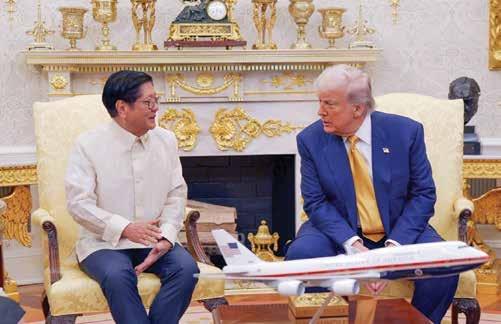
exchange, the Philippines has
access to U.S. exports. “President Marcos is a very good and tough negotiator,” Trump said. Malacañang photo
by AJPress
MANILA — President Ferdinand “Bongbong” Marcos Jr. has returned to the Philippines following a three-day official visit to the United States, where he met with U.S. President Donald J. Trump to advance bilateral cooperation on trade, security, and investment.
The visit, which concluded on July 22, 2025, included discussions at the White House and other high-level engagements with American officials. In a joint appearance, Trump confirmed that the U.S. would impose a 19% tariff on goods imported from the Philippines—down from a previously proposed 20%—while the Philippines
u PAGE 2
Pacquiao
held to
draw in comeback: A champion’s spirit still shines at 46
by AJPress
LAS VEGAS — On the evening of July 19, 2025, Manny Pacquiao returned to the ring at age 46—older, wiser, and still hungry. Facing reigning WBC welterweight champion Mario Barrios at the MGM Grand, Pacquiao wasn’t just fighting for a title. He was fighting for something more enduring: legacy. The bout ended in a majority
draw. Two judges scored the fight 114–114, while one gave Barrios a narrow edge at 115–113. Barrios retained the belt, but the night belonged to Pacquiao— proof that time may slow a man, but it cannot silence a legend. From the streets to the pinnacle of boxing Manny Pacquiao’s story is no ordinary rise. Born in Kibawe, Bukidnon, and raised in the streets of General Santos City,
u PAGE 2
“President Marcos is a very good and tough negotiator,” Trump said. “They’ve been very serious. This is a very serious negotiation. They wanted it badly. We wanted it.”
Filipino workers removed from cruise ship in US immigration raid
by Bing Cardenas Branigin Inquirer.net
NORFOLK — At least 18 Filipino workers “were forcibly removed in handcuffs” from a cruise ship at the Port of Norfolk in Virginia recently, sent back to the Philippines and banned from re-entry to the United States for 10 years, Filipino American community leaders said Saturday, July 19.
The U.S. Customs and Border Protection (CBP) removed the Filipino workers, all with valid 10-year visas, from the Carnival Sunshine cruise line, the Pilipino Workers Center (PWC) and the National Federation of Filipino Ameriu PAGE 2
The International Criminal Court has postponed its ruling on Rodrigo Duterte’s interim release, keeping him in custody while his legal team prepares further submissions
by Jean Mangaluz Philstar.com
THE HAGUE, Netherlands – The International Criminal Court (ICC) has postponed its decision on former Philippine President Rodrigo Duterte’s request for interim release, allowing his legal team more time to provide additional information. In a ruling made public Wednesday, July 23, evening, the ICC’s Pre-Trial Chamber I
u PAGE 4
PAGE 1
“We’re going to be putting a 19% tariff on products coming in from the Philippines. They’re going to be taking our products in for nothing. That’s what we wanted, and we got it.”
“We’re very close to finishing a big trade deal with the Philippines.”
Trump characterized the outcome as a move toward a “very open market” between the two nations, adding that the Philippines is a “very important nation militarily.”
Strategic talks and diplomatic engagements
In addition to the Oval Office summit, President Marcos held a series of high-level meetings during his visit:
• At the Pentagon, Marcos met with U.S. Secretary of Defense Pete Hegseth on July 21, where both sides reaffirmed their mutual defense commitments, particularly in the context of maritime cooperation in the Indo-Pacific region.
• Secretary of State Marco Rubio hosted Marcos at the State Department for dis-
cussions focused on trade, regional security, and diplomatic coordination.
• Marcos also met privately with Central Intelligence Agency (CIA) Director John Ratcliffe at CIA headquarters in Langley, Virginia.
The Philippine Presidential Communications Office confirmed the meeting, although no details were released publicly.
Domestic and regional response
In Manila, Philippine officials publicly welcomed the outcomes of the Washington visit. Trade Secretary Roque reiterated the country’s commitment to pursuing “balanced” trade partnerships and expressed readiness to engage with U.S. stakeholders on sectoral cooperation.
Meanwhile, labor and industry groups raised concerns about the potential impact of the 19% tariff on key Philippine export sectors such as electronics and agricultural goods, which are heavily dependent on access to the U.S. market.
In Beijing, China’s Minis-
try of Foreign Affairs issued a statement calling on all parties to avoid actions that might “escalate tensions” in the South China Sea, where the Philippines is a claimant and has reported repeated encounters with Chinese vessels in its exclusive economic zone.
Charting future ties
Marcos’s return to the White House—his first since Trump’s second term began in January 2025—was seen as a reaffirmation of a decades-old security and economic alliance shaped by evolving regional challenges. While no formal joint statement was issued, both sides described the discussions as productive and based on mutual strategic interest.
The visit positioned the Philippines as the first Southeast Asian country to engage in a state-level summit with the Trump administration in its current term, setting the stage for further cooperation in trade, defense, and diplomacy in the coming months. n
PAGE 1
agreed to duty-free access for select U.S. exports. Both sides described the meeting as productive, with additional agreements expected to follow.
“We’re very close to finishing a big trade deal with the Philippines,” Trump said, while emphasizing the “seriousness” of the negotiations.
The Department of Trade and Industry (DTI) said it would pursue follow-up discussions with U.S. counterparts in the coming months, with a focus on expanding market access and attracting investment in sectors such as renewable energy and infrastructure.
TYPHOON AFTERMATH AND NEW STORM WARNINGS
As the President returned, large parts of Luzon remained affected by flooding caused by the enhanced southwest monsoon intensified by Typhoon Wipha, which passed west of the Philippines after making landfall in northern Vietnam. According to the National Disaster Risk Reduction and Management Council (NDRRMC), over 90,000 residents were dis-
placed in provinces including Bulacan, Pampanga, Bataan, and Metro Manila.
The Department of Social Welfare and Development (DSWD) has mobilized relief supplies to evacuation centers while local government units continue to clear affected areas.
At the same time, the Philippine Atmospheric, Geophysical and Astronomical Services Administration (PAGASA) issued warnings for Tropical Storm Emong (international name: Gaemi), which developed over the West Philippine Sea. Signal No. 1 was raised in parts of Northern Luzon, including Ilocos Sur, La Union, and Pangasinan, with forecasters warning of possible landslides and flash floods.
ECONOMIC AND POLITICAL PRESSURES AT HOME
President Marcos returns amid persistent economic challenges. According to the Philippine Statistics Authority (PSA), inflation stood at 3.0% in June 2025, with food and transport prices continuing to weigh heavily on Filipino households. A Social Weather Stations (SWS) survey conducted in late 2024
PAGE 1
can Associations (NaFFAA) said in a joint statement.
The workers, who have not been charged or found guilty of any crime, were removed “in an alarming escalation of unjust immigration practices,” the PWC and NaFFAA said.
“These crew members are dedicated parents and spouses with exemplary backgrounds, having passed rigorous background checks to obtain their work visas,” they said.
“Their abrupt removal, accompanied by the cancellation of their visas and a shocking 10-year ban from re-entry, has inflicted deep humiliation,
plunging their families into dire financial straits.”
The CBP confirmed an ongoing operation but did not provide details, according to a USA Today report. Other cruise lines affected include Viking and Pearl Seas Cruises.
The crew members had valid work visas and were previously cleared to work in the U.S., the report said.
As the Carnival Sunshine is set to dock again in Norfolk this Sunday, July 20, the remaining crew members “are left in fear of being the next victims of these aggressive actions,” the PWC and NaFFAA added.
The Fil-Am groups said the workplace raids reflect “a
disturbing national trend that has seen other crew members deported under similar false pretenses, despite their valid visas and lack of criminal charges.”
“Community members are outraged by this blatant mistreatment of Filipino workers and are demanding accountability from Customs and Border Patrol, Carnival Corporate and the Philippine Embassy to safeguard the rights and well-being of Filipino and other cruise ship seafarers,” the groups said.
PWC, NaFFAA, immigration advocates and faith-based leaders will hold a press conference on Sunday. n
he sold bread and cigarettes as a child to feed his family. At 14, he left home, slept on cardboard in Manila, and took up boxing as a means of survival.
found that 63% of Filipinos still considered themselves poor, underscoring widespread concerns over costof-living pressures.
At the same time, the administration faces renewed political headwinds following midterm gains by opposition forces—particularly allies of former President Rodrigo Duterte and Vice President Sara Duterte. The widening rift between the Marcos and Duterte camps, driven by disagreements over constitutional reform and elements of foreign policy, has intensified political polarization just as the government contends with disaster recovery, economic strain, and rising public dissatisfaction.
In response, Malacañang undertook a Cabinet recalibration, appointing new leadership where needed and reaffirming its policy direction for the remainder of Marcos’s term. Although the reshuffle has been implemented, performance monitoring remains ongoing. Analysts view the move as a strategic—if familiar—effort to consolidate control and adapt governance to evolving political dynamics. n
By 16, he turned professional. His rise was meteoric—winning world titles in eight weight divisions, a feat no other boxer in history has matched. He defeated titans like Marco Antonio Barrera, Miguel Cotto, and Oscar De La Hoya, and became a global force not just in the ring but in the hearts of millions.
Pacquiao was never the biggest fighter. But he didn’t need to be. He climbed to the top not with size, but with grit—a fearless, fighting spirit honed by hardship and hardened by hunger.
A senator, a servant, a dreamer
By the 2010s, Pacquiao had expanded his battles from the ring to the political arena. Elected to the Philippine Congress and later to the Senate, he advocated for poverty alleviation, education, and anticorruption reforms. In 2022, he made a bold run for the presidency of the Philippines. He lost.
The campaign ended with a third-place finish in the national vote. But Pacquiao accepted defeat with humility and grace, saying, “I will continue to serve the people in whatever way I can.” For many, the loss humanized him even more. He had dared to dream—again—and handled disappointment with

Manny Pacquiao to earn up to $20 million in comeback fight vs. Barrios
LAS VEGAS – Boxing icon
Manny Pacquiao is expected to take home as much as $20 million from his July 19, 2025 bout against reigning WBC welterweight champion Mario Barrios, according to multiple reports detailing fighter purses and projected pay-per-view revenue.
The 46-year-old Filipino legend—who returned to the ring after nearly four years in retirement—earned a guaranteed purse of $12 million, with an additional $5 to $8 million estimated from pay-per-view shares and promotional bonuses. If projections hold, Pacquiao’s total compensation could reach $17 million to $20 million, making it one of his highest paydays since facing Floyd Mayweather Jr. in 2015.
Barrios, 30, received a guaranteed payout of $1 million. While his share of PPV
revenue is expected to be modest compared to Pacquiao’s, the titleholder still secured the biggest purse of his career.
The fight, held at the T-Mobile Arena in Las Vegas, ended in a majority draw, with two judges scoring it evenly (114-114) and one narrowly favoring Barrios (115-113). Although no winner was declared, the bout marked a triumphant return for Pacquiao, who showcased flashes of his trademark speed and aggression despite the age gap.
Pacquiao’s impressive earnings reaffirm his global draw and the enduring interest in his legendary career.
With no formal retirement announcement yet, speculation continues on whether this was a one-time comeback—or the prelude to another title campaign.

PAGE 1
that specializes in immigration law, stresses Chin. There may be legal avenues to remain in the country, especially for those with U.S. citizen relatives or individuals who unknowingly hold U.S. citizenship through a parent or grandparent.
Many nonprofit organizations, such as CHIRLA, Catholic Charities, ASOSAL, CARECEN, the San Bernardino Community Service Center, and the Amica Center, among others, provide free or low-cost legal services to immigrants.
‘Scare a million people a year’
According to the Department of Homeland Security’s Project Homecoming website, undocumented immigrants who “self-deport” under the program can receive assistance in the form of a plane ticket, a $1,000 exit bonus, and forgiveness of fines for “failing to timely depart.”
Russell Jauregui is an attorney at San Bernardino Community Service Center, which supports immigrants with legal services and education. He says such statements, echoed in official ads running on local stations that promise, “If you leave now, you may have an opportunity to return,” offer a sense of “false hope” to communities experiencing fear and uncertainty over ongoing immigration raids.
“I think the administration is relying on self-deportation. In other words, I don’t think they can arrest and deport a million people a year… but they can scare a million people a year,” explains Professor Hiroshi Motomura, faculty co-director at the Center for Immigration Law and Policy at the University of California, Los Angeles (UCLA).
ICE arrests have surpassed the 100,000 mark during Trump’s second term, with pressure on the agency to meet a goal of 3,000 arrests per day nationwide.
It remains unclear how many have participated in the Project Homecoming program. A DHS press release in May suggested some 64 individuals had chosen to be returned to Honduras and Colombia. Mexican officials reportedly confirmed that a small number of those detained in recent raids in Los Angeles opted to self-deport rather than face extended detention or removal proceedings.
The administration also recently deported several individuals to the small African nation of Eswatini. The five men hail from Vietnam, Jamaica, Laos, Cuba, and Yemen.
For Motomura, such tactics are part of a broader strategy. “It’s really a central feature of the administration strategy to scare people and then to get people to leave on their own,” he says.
‘Why don’t you just go to jail?’
Amelia Dagen is an attorney with the Amica Center, which provides legal representation to immigrants. She told The Marshall Project that government materials once used to share information about legal services are now being replaced by posters promoting self-deportation.
Such pamphlets are not only posted in detention centers, she says, but also appear in courtroom lobbies, and are even passed out with official court documents.
Advocates say the effort is part of a strategy to discourage people from seeking legal assistance. “They’re trying to lock as many people up and they don’t want them talking to attorneys,” says attorney Nicholas Mireles, who has been representing immigrants for more than twelve years. “They don’t want them, you know, asking about their rights.”
The whole approach undermines due process, insists Mireles, offering the analogy of someone in criminal proceedings being told by the court, “Instead of going through the trial and witnesses and having the government prove their case, why don’t you just go to jail?”
Still thinking of self-deporting?
For those still contemplating self-deportation, Chin says they should gather and preserve key documents that may become essential later on, especially if they hope to return or apply for legal status in the future. Financial records—such as tax returns, pay stubs, or any proof of tax payment—can be especially important, as some legalization programs require evidence of tax compliance. Similarly, proof of residence is often a critical component in immigration cases, so items like utility bills, rental agreements, or lease receipts should be collected to demonstrate sustained residence in the U.S. Chin
also emphasizes that individuals leaving the country should carry official documentation for any U.S.-born children or relatives traveling with them, including birth certificates and passports.
“It might not make a difference right now,” he admits. “But over the years, various kinds of proposed and actual legalization programs have depended on a certain period of residence in the United States, and so it could become relevant in the future.”
For those who own property, a power of attorney can be essential. More urgently, for anyone leaving behind children or dependents, it’s vital to ensure proper legal custody arrangements are in place. Each state has different laws, but generally, someone must be legally designated to make decisions regarding a child’s education, medical care, and day-to-day needs.
In many cases, appointing a legal guardian is the appropriate step, and it may require formal legal proceedings.
Chin warns that those preparing to self-deport are still susceptible to law enforcement if they have pending criminal cases or outstanding warrants. In such situations, consulting a criminal defense attorney beforehand is critical, he says.
Seek help and don’t jump to conclusions
In moments when confusion and fear feel overwhelming, reaching out can be the most important first step, explains Mireles.
While resources are stretched, trusted networks—whether a church, school, or community organization—can offer guidance at no cost. “Information is power,” he notes, adding that the hardest part is often finding the courage to ask for help.
“People just have to try not to jump to conclusions or make life-changing decisions all of a sudden,” he advises. “Maybe waiting and seeing and giving it a week, giving it a month that day-by-day approach may be the best thing they can do for themselves and their family.”
He adds, “I think the point of everything these days is to overwhelm people so much so that they just give up. But, like anything in this world, when you feel that way… that’s when you have to really dig down deep and ask for help.” (Inquirer.net)

said the decision would be deferred “until further action is undertaken by the defense on the matter, or until when the chamber will deem it appropriate.”
The court emphasized that the move does not signal approval or denial of Duterte’s appeal and should not be interpreted as favoring either side in the ongoing
Judges Iulia Antoanella Motoc and Reine AlapiniGansou supported the deferral, while Judge Socorro Flores Liera issued a partial dissent, saying the Chamber should proceed with a decision now.
Duterte’s legal team had requested the delay, citing the need to review redacted materials and submit a more complete response.
The former president remains in ICC custody while facing charges of crimes against humanity for thousands of killings linked to his administration’s controversial war on drugs. His lawyers have asked the court to release him temporarily while the case is ongoing.
The ICC has not set a timeline for when it will revisit the matter. n
PAGE 2
the same dignity he showed in victory.
The comeback that transcended titles
Three years after his retirement, Pacquiao announced a comeback. Critics questioned the move. At 46, what more could he prove?
Plenty.
On fight night, he showcased flashes of the fighter the world fell in love with. His footwork, timing, and flurries of punches dominated the middle rounds. Barrios, 16 years younger at age 30, rallied late and secured the draw by taking the 12th round on all cards. Yet Pacquiao walked away as only he could: with his chin up, his legacy intact, and the roar of fans in his ears.
“I thought I won the fight,” Pacquiao said afterward. “It was a close fight. My opponent was very tough. It was a wonderful fight.”
A worthy opponent in Barrios
For his part, Mario Barrios proved he was more than just the younger fighter—he was a composed and technically sound champion. The 30-year-old Texan absorbed
Pacquiao’s early pressure and executed a smart, measured strategy down the stretch. His strong finish in the final round sealed the draw and allowed him to retain the WBC welterweight title. After the bout, Barrios showed deep respect for the Filipino icon, calling it an “honor” to share the ring with a legend.
Generations apart, but shoulder to shoulder
When Mario Barrios was just 8 years old, Manny Pacquiao had already shaken the boxing world. In 2003, Pacquiao delivered a career-defining knockout of Marco Antonio Barrera—a stunning victory that announced his arrival as a global force. While Barrios was still in grade school, Pacquiao was already headlining pay-perviews, earning his place among the sport’s elite. More than two decades later, they stood shoulder to shoulder in the same ring—proof that greatness can endure and even span generations.
More than a champion
Even outside the ring, Pacquiao’s impact endures. He has built homes for the poor, funded surgeries and scholarships, and launched
charitable foundations. He has been a voice for the underprivileged, a symbol of resilience, and a beacon for Filipino pride on the world stage.
He has inspired not only with his fists but with his faith, generosity, and relentless hope.
“You don’t need to be born into privilege to do something great,” Pacquiao once said.
“You just need to believe and never stop fighting.”
Final bell, eternal legacy
Manny Pacquiao may never become president. He may never fight again. But what he’s given the world, through struggle, sacrifice, and service, will never fade.
He is not just the greatest Filipino boxer of all time. He is one of history’s most remarkable lives.
From cardboard floors to championship belts.
From poverty to greatness. From the streets to the pinnacle of boxing.
And on this July night in Las Vegas, Manny Pacquiao reminded fans and critics alike – yet again: Champions aren’t defined by titles. They’re forged through grit. n
by AJPress
LOS ANGELES – U.S. Immigration and Customs Enforcement (ICE) agents will arrest any undocumented immigrant found in the country illegally, regardless of whether they have a criminal record, Acting ICE
Director Todd Lyons confirmed in a recent interview aired by CBS News.
In a sharp escalation of the agency’s enforcement posture, Lyons stated: “If we encounter someone who’s here in the country illegally, we will take them into custody.” The remarks mark a shift from prior policies that prioritized apprehension of individuals with serious criminal offenses or national security concerns.
“We still prioritize the worst of the worst,” Lyons said. “But we’re not going to turn our back on immigration violations just because someone doesn’t have a rap sheet.”
The policy, which has alarmed immigrant com-
munities and civil rights advocates, reflects a broader strategy by the Biden administration’s successor, President Donald Trump, to intensify immigration enforcement and override sanctuary policies in place in multiple states and cities.
‘Collateral arrests’ expand
Under the expanded guidance, ICE officers conducting workplace operations or targeted arrests will now also detain any undocumented individuals encountered at the scene—even if they were not initially targeted.
These so-called “collateral arrests” have been criticized by human rights groups as indiscriminate and likely to create fear among law-abiding immigrant communities.
ICE has said the increased community operations stem from local law enforcement agencies refusing to honor ICE detainers—requests to hold undocumented individuals already in jail for transfer to federal custody.
“When jurisdictions won’t cooperate, it forces us to go
out into communities,” Lyons told CBS.
As of July 2025, ICE has reinstated workplace raids in several states and revived its controversial “no sanctuary” policy, allowing agents to conduct arrests even near sensitive locations such as schools, hospitals, and courthouses—actions once discouraged under previous administrations.
Raising the stakes: new detention policies and quotas
According to an internal DHS memo obtained by the Associated Press, ICE has also ramped up daily arrest quotas and reduced detainee access to immigration bond hearings. A proposal introduced earlier this month aims to deny initial hearings for certain detainees, effectively prolonging detention without judicial review. Civil liberties groups have already filed legal challenges.
The agency has received increased funding to expand detention bed capacity and transport resources. In fiscal
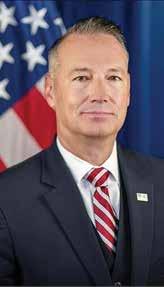
year 2025, ICE aims to detain between 3,000 to 7,000 individuals per day, up from a daily average of 1,900 earlier this year.
Advocacy groups push back
Immigrant advocacy organizations have called the new policies “inhumane, reckless, and legally ques-
tionable.” The American Civil Liberties Union (ACLU) and the National Immigration Law Center (NILC) warn that due process rightsare being undermined by the removal of oversight mechanisms such as bond hearings and case-by-case discretion.
“We’re deeply concerned that ICE is criminalizing presence alone,” said Andrea Flores, a senior policy counsel at NILC. “Being undocumented is not a crime—it is a civil violation. Treating it as criminal opens the door to unconstitutional overreach.”
In sanctuary jurisdictions such as San Francisco, Los Angeles, and New York, local officials say they are limited in their ability to protect residents from federal enforcement but vow to continue supporting legal defense programs, community alerts, and immigrant service hubs.
Know your rights
Legal experts stress that all individuals—regardless of immigration status—have
constitutional rights. These include the right to remain silent, the right to speak to a lawyer, and the right to refuse consent to a search without a warrant signed by a judge.
Several cities have reactivated ICE watch networks such as StopICE.net, a rapid-response system with more than 470,000 subscribers that alerts communities of reported ICE activity.
Ongoing legal battles
As ICE expands its authority, immigration courts are bracing for a surge in case backlogs and detainee intakes. Meanwhile, civil rights organizations continue to monitor arrests for possible constitutional violations. Lawsuits have already been filed against ICE’s courthouse arrests and expanded use of detainers without probable cause. For Filipino American families and other immigrant groups with undocumented members, advocates advise immediate consultation with qualified immigration attorneys and legal aid clinics. n


THE recent summit between Philippine President Ferdinand “Bongbong” Marcos Jr. and U.S. President Donald Trump in Washington, D.C. marked another chapter in the long and often complicated relationship between the two countries.
Held at the White House on July 22, 2025, the meeting featured public pledges of strengthened cooperation, military alignment, and economic exchange—most notably, a negotiated 19% U.S. tariff on Philippine imports, down from a previously proposed 20%, with the Philippines granting duty-free access to American goods in return.
For some, the numbers may seem minor. For others, they represent deeper currents in a relationship where trade, defense, and diplomacy are never far from politics.
Observers noted the tone of the summit: President Trump, now in the final term of his presidency, appeared eager to secure
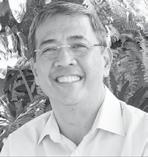
WHAT would you do if you were “kiss-cammed,” “caught in the act” or “coldplayed” beyond deniability? How do you recover after millions of memes, re-enactments, spoofs are done about it? There are allegedly over 50 million-plus netizens who’ve watched the Kisscam video of the accidental exposé of an “affair” during a Coldplay
legacy-shaping agreements across the Pacific.
President Marcos, meanwhile, arrived with the weight of balancing regional pressures, a rising China, and expectations at home and abroad. Their joint appearance in the Oval Office conveyed unity—but also reflected the uneven power dynamic that has long defined U.S.–Philippine ties.
Whether this visit marked a new era in strategic trust or was simply a continuation of transactional politics is a question still unfolding.
On the surface, the optics of camaraderie were unmistakable. The language was opti-
concert. If you have not, just google “Coldplay Kisscam” or “CEO caught by kisscam/ Coldplay.”
The incident was the perfect series of unfortunate events, starting with the Kisscam focusing on PDA couples or “publicly displaying affection,” until one couple reacted in sheer terror and embarrassment seeing themselves on the concert screens.
Unfortunately, their next move was tragically hilarious as they broke for cover, the woman hiding her face, the man ducking behind the seats


mistic. The smiles were choreographed. But beneath that surface lie questions—some old, others urgent.
and a woman next to them smirking in obvious amusement.
That in itself amused the audience but it was the cheeky off-the-cuff remark of band leader Chris Martin that did the couple in: “Oh look at these two, either they’re having an affair or they’re just very shy.”
It turned out the man was a company CEO and the woman the company’s head of HR. The CEO was married and the HR manager, I read was recently divorced.
THE world’s eight richest individuals have as much wealth as the bottom half of the world.
So, is that immoral or not?
The answer is a lot more complex than that, a new study shows.
The study shows that people in Russia, Switzerland and Ireland held the strongest moral opposition
LAGMAY ORIEL Publisher & Chairman of the Board
What does it mean when a president agrees to open Philippine markets further
Hoarding too much money, is it good or bad?
to having too much money.
On the other hand, people in Peru, Argentina and Mexico were least likely to show moral objections to having excessive wealth.
All national cultures, on average, found excessive wealth to be between “not wrong at all” and “moderately wrong,” according to the study, indicating that few people might hold the belief that possessing excessive wealth is extremely
unacceptable from a moral standpoint.
The study was published June 24, 2025, in PNAS Nexus, the sibling journal to the Proceedings of the National Academy of Sciences, the official journal of the U.S. National Academy of Sciences.
“People’s moral judgment of excessive wealth should not necessarily be the same as their moralization of economic inequality,” says the
not the subject of any litigation or claim that might give rise to any litigation.
Publication of a Client’s Material does not constitute an a greement to continue publication.
Client agrees and covenants to indemnify AJPI and its officers against any and all loss, liability, damage, expenses, cost, charges, claims, actions, causes of action, recoveries, judgments, penalties, including outside attorneys’ fees (individually and collectively “Claims”) which AJPI may suffer by reason of (1) Client’s breach of any of the representations, warranties and agreements herein or
by Cristina Chi Philstar.com
MANILA — United States
President Donald Trump is optimistic that the U.S. and the Philippines will amass "more ammunition than any country has ever had" through a proposed ammunition manufacturing hub at Subic Bay, the site of a former American naval base.
Trump said this at his first face-to-face meeting with President Ferdinand Marcos Jr at the White House on Tuesday, July 22, where the two leaders discussed expanding military cooperation amid rising tensions in the South China Sea.
"It's very important. Otherwise, we wouldn't have ap-
proved it," Trump told reporters during a free-wheeling press conference alongside Marcos.
"We're going to end up in a few months, we'll have more ammunition than any country has ever had," Trump said, adding that this includes "all the speedy missiles... the slow ones, the accurate ones, the ones that are slightly less accurate."
The U.S.’ House of Representatives passed a defense spending bill in July directing officials to study the feasibility of establishing the "joint ammunition manufacturing facility" at Subic Bay.
The proposed facility would store ammunition stockpiles and "related materials" needed to produce explosives and
ammunition.
For the U.S., the planned construction of the ammunition hub in the Philippines solves its problem of not having a "forward stage ammunition manufacturing facility in the Indo-Pacific," according to the June 16 report by the American lawmakers.
For the Philippines, however, it would be a major shift from its decision to expel American forces from Subic and other bases in 1991.
Marcos described the proposed ammunition plant as being part of the Philippines' "self-reliance defense program" that would help the country "stand on our own two feet."
"The reason that we have
8
PAGE 6
study’s co-writer, Jackson Trager of the Brain and Creativity Institute University of Southern California (USC).
“One might think of economic inequality as morally wrong but still find excessive wealth morally permissible.”
“While inequality is recognized as a moral issue in many societies, it is not clear whether people hold similarly negative views about individuals with excessive wealth,” says Trager, a behavioral researcher at USC’s Department of Psychology.
“Our research investigates the moralization of inequality and the immorality of excessive wealth,” says co-writer Mohammad Atari of the Department of Psychological and Brain Sciences, University of Massachusetts Amherst.
“The immorality of excessive wealth might vary substantially based on people’s moral intuitions, cultural background, socioeconomic status, and the structural economic systems they live in.”
The researchers examined how people’s various moral concerns predict the moral judgment of excessive wealth across 20 nations, complemented with a survey in the United States further examining the relationship between moral concerns and other types of excess such as excessive knowledge and excessive anger) as well as attitudes toward different ways of excessive wealth acquisition and expenditure.
The study involved demographically stratified samples with 4,351 participants mirroring demographics in terms of gender, education and age (and political ideology in the United States) across Argentina, Belgium, Chile, Colombia, Egypt, France, Ireland, Japan, Kenya, Mexico, Morocco, New Zealand, Nigeria, Peru, Russia, Saudi Arabia, South Africa, Switzerland, United Arab Emirates and the United States.
When looking at overall wealth, the study found that countries with high GDP per capita (richer countries like Ireland and Switzerland) were more likely to find excessive wealth immoral than countries with lower GDP per capita (Nigeria or South Africa).
It also found that when controlling for religiosity, conservatism, moral attitudes toward wealth acquisition, moral attitudes toward wealth spending, and other moral values, the endorsement of authority and age still had a significant negative relationship with the immorality of excessive wealth, partially similar to the main study’s findings.
“Hence, older people and those high on authority have less severe moral objections to having too much money,” says Trager, the study’s first author. “The moralization of benevolent spending, exploitative spending, and benevolent acquisition of wealth were all significantly positive-
PAGE 6
in exchange for a marginal tariff reduction? How do Filipinos—both in the homeland and in the diaspora— interpret this gesture? Are we looking at a partnership evolving in equality, or a relationship still rooted in deference?
Filipino Americans, who watched from a distance, were not a central part of the summit’s official agenda. Despite their growing influence in U.S. society, their voices remain on the periphery when statecraft unfolds at this level. Should that change? And if so, who will initiate that shift?
The broader context matters. The Philippines continues to navigate regional tensions in the South China Sea, where Beijing has grown more assertive. Manila’s alignment with Washington offers reassurance to some—and concern to others who fear entanglement in great power politics. At what point does security cooperation become strategic dependence?
We raise these questions not to answer them definitively, but to suggest their importance. The true meaning of this summit may not lie in the speeches or press statements, but in what hap-
pens in the weeks, months, and years that follow. Will Filipino exports grow under this new tariff structure? Will the benefits of trade reach ordinary workers and families? Will diplomatic goodwill translate into long-term resilience for the Philippines—politically, economically, and culturally? Diplomacy often moves in symbols and gestures. But history tends to reveal whether those gestures were substance or show.
In this moment, perhaps what’s needed most is not celebration or condemnation—but reflection. (AJPress)
ly associated with the immorality of excessive wealth.”
The correlation between acquiring and spending wealth as immoral and viewing excessive wealth in general as immoral suggests that people seem to morally evaluate not just the existence of excessive wealth, but the paths through which it is obtained and used, Atari says.
Many people in the study appear to agree that having too much money is not immoral, but this view is not universal. “Left-leaning individuals, people living in egalitarian societies, those who highly value equality, people in higher socio-economic status, and people who value purity appear to think of excessive wealth as more objectionable,” Trager says.
The study concludes “that moral condemnation of excessive wealth is not just about harm or different flavors of justice; rather, it may have a more complex moral underpinning
“To many, possession of excessive wealth may be disgusting and unnatural due to the degrading nature of excess, suggesting there is more of a psychological truth to the term filthy rich than merely being an American metaphor.” (Philstar.com)
* * *
The opinions, beliefs and viewpoints expressed by the author do not necessarily reflect the opinions, beliefs and viewpoints of the Asian Journal, its management, editorial board and staff.
PAGE 6
It has been a long time since a simple Kisscam video has caused a viral global reaction. In the beginning people enjoyed the dark humor in the situation but it didn’t take long before many called it “just deserts” or their deserved outcome.
After a few days, millions of people began to publicly state their view or sentiment regarding “infidelity,” “an affair” and poor judgment. This I have to say was a departure from the practice of “minding your own business, being politically correct or respecting peoples’ choices or privacy.”
One lady associated with the team in charge of the Kisscam coverage was quite unapologetic about the incident, saying the couple’s PDA and reaction did them in. Her parting words, “You play stupid games, you win stupid prizes.”
Needless to say, many women were livid about a couple of cheaters who actually attended such a public event while grown kids and the CEO’s wife were clueless at home. Others expressed disbelief that the couple would date in such a public event.
Reacting to the workplace “affair,” executives and employees all said: “Don’t put dirt in your own backyard.”While many don’t talk openly against it, executives clearly disapprove of such behavior.
The incident reminded me of a statement I once heard pointing out that “modern life,” movies, etc. are responsible for taking the sting out of adultery, theft and other oldworld sins.
Those who control our language have lessened the severity of our sins, calling them poor judgment. But think of
it as a crime instead of as an “affair” and then things get serious.
Yes, as far as I know, marital infidelity is a crime in the Philippines and depending on how you get involved, determines if you are an accomplice or not. I am certain that in the future we will hear about lawsuits involving workplace-tolerated infidelity/crime.
But how does one deal with the situation? Memes have come out about the lady next to the couple, suggesting she is the officemate who knows everything going on in the office. The mythical officemate may not have been an accomplice but would be guilty of complicity, knowing about the affair.
Everyone has been asking what do you do when you catch a friend’s wife or husband cheating with someone else? The general response was, “look away,” “mind your own business” or, worse, people calling it a victimless crime between two consenting adults!
What if someone you caught in the act pleads with you to act like you never saw anything or worse, to actually cover up for him/her? Either way, you are dragged into their sin and criminal offense.
The Kisscam couple are no different from somebody who publicly carries out their infidelity and carelessly or accidentally involves friends or people who witnessed their behavior.
In a ladies chat group that addressed the same questions, someone suggested to act clueless and ignorant but find a way to inform the injured party anonymously. That is quite wise and safe because the injured party might blurt
out your name in the heat of anger and toss you under the bus!
From personal experience, I have often told “cheaters” to keep me out of their mess and to pray to God that their partner/wife/husband never asks me because I will speak the truth. By doing so, you risk losing one friend but by not telling the truth, you lose both!
On a more serious note, I just want to remind Kisscam characters that if you are married, the presumption is you knowingly entered into and signed a contract of marriage. Our mistake is we think the contract is between “man and wife,” conveniently forgetting God as the third party.
The agreement between man and wife is to love and care for each other. The agreement with GOD is that if we live under his covenant, he will protect, provide, prosper and propagate us, our lives, families and all we do. However, the contract and covenant is only valid as long as we stay faithful to the provisions thereof.
If you violate the contract, you lose all the privileges and rights provided, and so does your spouse, your children, your people and your “house.”
The CEO had to resign, is looking at divorce proceedings, losing his family, etc. His dalliance already broke the first contract and has now broken someone else’s. In all of it, the innocents suffer! (Philstar. com)
* * *
The opinions, beliefs and viewpoints expressed by the author do not necessarily reflect the opinions, beliefs and viewpoints of the Asian Journal, its management, editorial board and staff.
* * * Email: utalk2ctalk@gmail.com
by AJPress
MANILA — San Miguel Corporation (SMC), led by Ramon S. Ang, has acquired a 3.8-percent stake in Manila Electric Company (Meralco) for approximately P3.9 billion, finalizing a 2008 agreement with the government-owned Land Bank of the Philippines.
The transaction involved 43.23 million shares sold at a fixed price of P90 per share, significantly below Meralco’s market value at the time of sale.
According to data from the Philippine Stock Exchange, Meralco closed at P544.50 per share on the trading day prior to the block sale. The agreed sale price reflects a discount of more than 83 percent from market value.
Transaction based on 2008 agreement
The sale stems from a share purchase agreement executed in 2008 between Land Bank and an SMC-affiliated entity. The deal was delayed due to legal proceedings, including a case before the
Sandiganbayan, which issued a resolution in 2024 allowing the transaction to proceed. The shares were transferred at the original P90 per-share rate specified in the 2008 agreement. No new price was negotiated.
Current market valuation
At a current trading price of approximately P545 per share, the 3.8-percent stake is valued at around P23.55 billion.
• Shares Acquired: 43.23 million
• Purchase Price: P90 per share
• Total Investment: P3.89 billion
• Current Market Price: P545 per share
• Current Value: P23.55 billion
• Difference in Value: P19.66 billion
The stake was acquired through a block sale and does not involve board control or voting majority.
Government explanation Land Bank officials stated that the sale was carried out in compliance with a court-approved transaction
and a legally binding agreement established in 2008. Government sources clarified that the state was not in a position to renegotiate the terms after the Sandiganbayan ruling affirmed the enforceability of the original sale contract. Background and market context
San Miguel previously held a controlling interest in Meralco between 2008 and 2009 before transferring its holdings to the First Pacific Group, a Hong Kong-based investment management firm led by Filipino businessman Manuel V. Pangilinan. Pangilinan serves as Managing Director and CEO of First Pacific and chairs several of its Philippine affiliates, including PLDT Inc., Metro Pacific Investments Corporation, and Meralco.
The recent acquisition revives SMC’s equity position in the utility company, though in a minority capacity. The transaction comes at a time of continued investor interest in infrastructure and energy assets, with Meralco remaining the country’s largest electricity distributor.
by daphne galvez Philstar.com
MANILA — The Department of Justice (DOJ) has withdrawn a motion filed before a Muntinlupa court seeking to reverse the acquittal of Mamamayang Liberal party-list Rep. Leila de Lima in one of her three drug charges.
Justice Secretary Jesus Crispin Remulla instructed the DOJ prosecutors to withdraw the motion, which was filed on Wednesday, July 23, according to Prosecutor General Richard Anthony Fadullon.
Fadullon said the motion “should not have been filed in the first place” due to double jeopardy.
The appeal was filed by the DOJ after the Muntinlupa Regional Trial Court Branch 204 upheld the acquittal of De Lima and her former driver Ronnie Dayan.
They were accused of illegal drug trade in the New Bilibid Prison (NBP).
De Lima welcomed the DOJ’s decision to withdraw the appeal.

Prosecutor Ramoncito Bienvenido Ocampo and his panel of prosecutors,” De Lima said in a statement.
She called on Remulla to “investigate and sanction” Ocampo, whose action she said was “politically motivated.”
secretary De Lima at her residence.
In 2022, Ragos recanted his testimony, saying that former justice secretary Vitaliano Aguirre II had coerced him to implicate De Lima in the illegal drug trade in Bilibid.


“I thank and commend Justice Secretary Remulla for bringing sense and order to the unethical actuations of
The DOJ had argued that De Lima’s acquittal mainly hinged on the recantation of the prosecution’s key witness, former Bureau of Corrections chief Rafael Ragos, who initially claimed that he delivered P10 million in drug money to then justice
All three drug charges filed against De Lima have been dismissed. She spent seven years at the police Custodial Center at Camp Crame in Quezon City. (With reports from EJ Macababbad, Delon Porcalla, Jose Rodel Clapano)
PAGE 7
encouraged more interaction with the United States is because it is necessary," Marcos added, noting the Philippines' increased engagements with other like-minded countries, including those from Europe.
Philippine Ambassador to Washington Jose Manuel Romualdez earlier said Manila was "open" to the construction of the U.S. ammunition facility because it offers "a combination of both defense and economic cooperation" that would create jobs.
Defense Secretary Gilbert Teodoro has also welcomed the proposal for its projected commercial benefits, but clarified on Tuesday that the government will review the plan as a "business proposal."
"[It] is on a business case basis, being foreign direct investment," Teodoro said, adding that they will have "more to report" after the review.
Already, Teodoro projects the ammunition hub will employ about 200 to 300 "highly technical people."
The planned ammunitions hub falls within the scope of
the U.S. and the Philippines' March 28 joint statement on defense industrial cooperation, which listed "ammunition components / energetics" as a priority area.
Potential risks
Fisher group PAMALAKAYA earlier criticized the proposed ammunition hub, saying its presence would pose a threat to Filipino fishers and "make us a target" of “U.S. rival countries."
The planned facility will be constructed in Subic Bay in Zambales, within the USbacked Luzon Economic Corridor, but also facing the South China Sea.
"We have expelled US military bases and troops before. We can’t see any reason why it is strengthening its military presence in our country, but to set the stage for provocative operations against China," Fernando Hicap, chairperson of PAMALAKAYA, said in a June 30 statement.
Scientist group AGHAM has also opposed the facility, citing environmental destruction and health impacts from past U.S. military presence in Subic Bay, including documented cases of children
who died after exposure to toxic waste.
In the same Tuesday press conference, Marcos said the actions the country is taking for the modernization of its military are a "response to the circumstances that surround the situation around the South China Sea."
Marcos added that the Philippines does not see a need to balance its relations between the U.S. and China — the world's two superpowers.
This is "simply because our foreign policy is an independent one," he added.
"We are essentially concerned with the defense of our territory and the exercise of our sovereign rights," Marcos said.
"Now, whether we do this not alone, we need to do this with our partners. And again, our strongest partner is — has always been the United States," the Philippine president added.
Trump interjected: "And I don't mind if he gets along with China, because we're getting along with China very well. We have a very good relationship." n


by Ian LaquI Philstar.com
MANILA — Philippine National Police (PNP) chief Gen. Nicholas Torre III has accepted the fistfight challenge issued by Davao City Mayor Sebastian "Baste" Duterte, calling it a “charity boxing match” for those affected by recent severe weather.
Duterte issued the challenge during a podcast on July 20, accusing Torre of acting brave only because of his official position.
The mayor’s remarks came in response to Torre’s role in leading the arrest of his father, former President Rodrigo Duterte, earlier this year.
He also questioned whether Torre's promotion to PNP chief was based on merit, citing his rapid rise from a lower rank.
In an interview with reporters on Wednesday, July 23,
Torre was asked about Duterte’s social media challenge. He quipped that he could keep up for 12 rounds.
“Tamang-tama, maraming nasalanta ngayon ng bagyo at baha. Maybe we can use this moment and this opportunity to raise funds…well, in a charity boxing match this coming Sunday? Sa Araneta,” he said.
(It's perfect timing; many people are affected by the storm and floods right now. Maybe we can use this moment and this opportunity to raise funds... perhaps through a charity boxing match this coming Sunday? At Araneta.)
“Siguro para malaki-laki ang mairaise natin, per round, may mag-sponsor,” he added.
(Perhaps to raise a substantial amount, we can have a sponsor for each round.)
When asked why he needed to engage with Duterte, he replied that it was a good oppor-
tunity to help those affected by the tropical cyclones.
“It's a good opportunity para makatulong sa ating mga kababayan. Kaya sigurado marami ang sponsor nito. All the proceeds that we raise will donated to charity,” he said.
(It's a good opportunity to help our fellow countrymen, so I'm sure there will be many sponsors for this. All proceeds we raise will be donated to charity.)
“I'll ask Araneta to set up a boxing ring. Hopefully, they will oblige,” he added.
The PNP chief added that he does not expect either of them to get injured, noting that both he and Mayor Duterte have boxing experience.
“Pareho naman kami siguro kung nag-practice or baka kung nag-practice, okay lang din. That's it,” Torre said.
(Both of us have likely practiced, or if we have, that's fine too. That's it.) n

by BeLLa CarIaso Philstar.com
MANILA — Netizens and celebrities have slammed Interior Secretary Jonvic Remulla for using an informal tone and language in announcing class suspensions on the official social media account of the Department of the Interior and Local Government (DILG).
Amid the continuing effects of the southwest monsoon on Tuesday, July 22, Remulla faced criticism for using “inappropriate” colloquial terms and casual language in his posts on class suspensions.
“Mga abangers, sarap ng bogchi ko. Sa kabusugan ay nakaidlip nang sandali. Oh, eto na inaabangan ninyo,” one of the posts in the DILG Facebook account read.
Some social media users criticized the post as insensitive to residents enduring the impacts of severe weather. Others stressed that topics like natural disasters should be treated with seriousness.
“There is a time and place for trying to be funny. This isn’t one of them,” actor Jake Ejercito commented. “Is this supposed to be funny?” actress Jessy Mendiola also replied.
Following the backlash, Vice President Sara Duterte urged Remulla to observe professionalism when making official announcements.
“If it came from the DILG official account…they have to be professional,” Duterte said in an interview in The Hague, Netherlands.
She emphasized that while individuals have freedom of expression, institutions are held to a different standard.
“The person has the freedom of expression, the institution does not have the freedom of expression,” Duterte added.
Duterte also drew a distinction between personal views and official duties, noting that her own voice as a public official is distinct from her role as a private individual.
“When it comes to the vice president, me, the person, my voice is also different,” she said.
Sorry, but I won’t change –Remulla
Despite criticisms, Remulla stood by his communication style, saying it has long been his way of connecting with the public even before joining the Cabinet.
In a radio interview over dzMM, Remulla apologized to those who may have been offended but made clear he had no intention of changing.
“They understood me in

Cavite. I hope they understand me, too. I have no intention to offend anybody,” he said in Filipino. “(But) if I have to apologize for hurting their sensibilities, then I do offer it. But I will not change who I am…That’s just the way people speak in Cavite. That’s just the way I speak.”
Further defending himself, he explained that the informal tone is to make official messages feel less heavy.
“I’m not belittling their hard work. What I’m doing is simply making reminders lighter so it’s not always negative vibes that people hear,” he said in an interview with GMA Integrated News’ “Unang Balita.”
“If my joke is inappropriate for you, just remember that I didn’t curse, belittle, or insult anyone. I also didn’t flatter or tell any lies. A little humor never hurt anyone,” he added in the DILG post.
Backing Remulla, President Marcos said what matters most is that the DILG chief’s messages reach their intended recipients.
“As long as he gets the message across, that’s what it’s for. That’s what all of these postings are for and get some information across,” Marcos told the reporters in Washington DC yesterday.
‘’People criticize me for the way I speak, criticize him for the way he speaks. But that’s just the way he speaks,’” he added.
Meanwhile, in light of the recent weather disturbances that prompted widespread class suspensions, a teachers’ group said it is too early for the Department of Education (DepEd) to call for makeup classes.
Alliance of Concerned Teachers (ACT) chairperson Vladimer Quetua said that while the concern of Education Secretary Sonny Angara on learning loss is valid, he emphasized that the academic calendar was specifically designed with buffer days to
account for such disruptions.
“The school calendar includes contingency days precisely for emergencies like these. This is still unnecessary,” Quetua said.
Angara has said that the DepEd is considering the implementation of makeup classes to mitigate learning loss following the widespread suspension of classes due to flooding spawned by the southwest monsoon.
“What the government should do is to focus on recovery programs to address the damage on livelihood and the physical and mental health of the students and parents due to the calamity,” Quetua said.
He said class suspensions are necessary protective measures, but also pointed to the deeper roots of chronic flooding and disaster vulnerability that continue to disrupt learning.
“We need long-term solutions to the climate crisis, not just temporary academic adjustments whenever disaster strikes,” Quetua said.
The Teachers’ Dignity Coalition (TDC) also opposed DepEd’s plan to hold makeup classes, particularly on Saturdays, saying it contradicts the agency’s own advocacy for work-life balance and existing guidelines.
“DepEd itself has emphasized the importance of rest and family time during weekends by banning homework. It is therefore contradictory to require students and teachers to attend make-up classes on Saturdays,” TDC chairperson Benjo Basas said.
“These directives are not only impractical but also lack empathy. Many families across Luzon and parts of the Visayas are still reeling from the effects of Habagat and recent typhoons. Expecting them to prioritize academic modules or online classes in this situation is unrealistic,” he added. (With reports from Emmanuel Tupas, Alexis Romero)
THIS week’s encore presentation of “Citizen Pinoy” proves how valuable and life-changing legal status and a green card can be to a person and especially to their children.
The story starts with Alice, who years ago ignored her father’s petition for her because she was too busy raising her two sons in Dubai. During a chance meeting in the Philippines with Atty. Michael J. Gurfinkel, she was told that her long-abandoned petition could still be reinstated so that she and her family can pursue their green cards.
While visiting her parents in the U.S. and waiting for her petition to be processed, Alice’s father passed away, causing her petition to “die” a second time. Atty. Gurfinkel found other solutions for Alice. Besides the Survivor Act, her husband’s Lebanese Priority Date was also used to expedite the
process. Except that her husband was hesitant to move to America because of a long-kept secret.
Despite various snags, Atty. Gurfinkel successfully obtained the green cards for Alice and her family. Now, a decade later, Alice lives a more fulfilling life in the U.S. as a teacher. Her success story continues through her son, Roget, who also greatly benefited from his mom’s green card. He now runs his own successful business fixing and remodeling million-dollar homes and provides for his own family. A green card can be a great blessing that continues to give for generations to come.
Don’t miss this uplifting success story on an encore presentation of CITIZEN PINOY – this Sunday at 6:30 PM PT (9:30 PM ET) on select Cable/Satellite providers, right after TV Patrol Linggo. (Advertising Supplement)

ATTY. GURFINKEL REVIVES PETITION THAT “DIED” TWICE AND STILL ENDS UP WITH A GREEN CARD. Life got too busy for Alice while she was raising her two sons in Dubai. She ended up abandoning the petition that her dad had filed for her in 1994. Years later, during a chance meeting in the Philippines with Atty. Michael J. Gurfinkel, she was told that her long-abandoned petition could still be reinstated so that she and her family can pursue their green cards. While visiting her parents in the U.S. and waiting for her petition to be processed, Alice’s father passed away, causing her petition to “die” a second time. Atty. Gurfinkel found other solutions for Alice. Besides the Survivor Act, her husband’s Lebanese Priority Date was also used to expedite the process---except that her husband was hesitant to move to America because of a long-kept secret. Despite various snags, Atty. Gurfinkel successfully obtained the green cards for Alice and her family. She is now a happy fulfilled teacher. Her success story continues through her son, Roget, who now runs his own successful business fixing and remodeling million-dollar homes and provides for his own family. Alice’s case proves how valuable and life-changing legal status and a green card can be to a person and especially to their children. Don’t miss this uplifting success story on an encore presentation of CITIZEN PINOY – this Sunday at 6:30 PM PT (9:30 PM ET) on select Cable/Satellite providers, right after TV Patrol Linggo. (Advertising Supplement)

PhIlIP S. chua, MD, FacS, FPcS

DR. EUSTAQUIO (Boy)
Abay, a retired Mayo-trained Fil-Am neurosurgeon in Wichita, Kansas, together with Philippine Secretary of Health, Teodoro Javier Herbosa, other medical and civic leaders in the Philippines, and our group in the United States, are grappling with a rural health outreach program that will provide healthcare access for the underserved people in remote municipalities in the Philippines, especially to those marginalized, suffering in the gutter of poverty. The main challenge is equitable healthcare access, besides the burden of some diseases.
Dr. Abay, who is spearheading this new movement is Chairman of the Filipino American Initiative to Transform our Homeland (FAITH), a subsidiary of the Filipino United Network-USA (FUN8888.com), affiliated with Gawad Kalinga, through the efforts of Dr. Abay.
Our initial Zoom (Manila-USA) Meeting was held on July 1, 2025, and another scheduled for July 24, 2025. The plan is to have a sustainable program for a more equitable healthcare access, to supplement the Universal Health Care (UHC) system, signed into law on February 20, 2019, as Republic Act 11223, with the following key components: PhilHealth, national healthcare insurance for all citizens, and the Department of Health, which will spearhead the national healthcare policies and program.
The who attended the July 1st Zoom Meeting were Secretary Herbosa, Boy Abay, Ernie Ordonez, retired Assistant Secretary of Agriculture, Dr. Ramon Paterno III and Dr. Buenaventura of the DOH, Juan M. Montero, President of the Montero Medical Mission, Domingo Alvear, President of the World Surgical Foundation), Ed Barcelona, Chairman, COPP-SPSA Surgical Outreach Program; and yours truly, Chairman of the Council of Past Presidents of the Society of Philippine Surgeons in America (COPPSPSA), a 501(c)3 Humanitarian Foundation in the United States.
In the Philippines, “about 75 percent of cities and municipalities have an insufficient number of healthcare workers,” according to the Philippine Institute of Development Studies. The DOH
reported “38.46 of 6th-class municipalities do not have doctors.” Around 40 percent of Filipinos live in rural areas, but only 10 percent of healthcare workers serve these forsaken areas; the 90 percent practice in the urban areas for obvious financial advantage. They, too, have families to support. The situation is most unfortunate. Indeed, poverty sucks!
For more than half a century since the 1960s, Filipino physicians at home and abroad have been doing medical missions to rural areas in the Philippines to help address this sad state of healthcare for the poor. Well-intentioned, these humanitarian projects are inadequate, hampered by life’s realities and insurmountable logistical problems.
These missionaries take off from their medical practice for about 2-4 weeks, pay for their own airfare from the United States, Canada, etc., purchase medications and equipment to use in their mission, spend for their local transportation, food, and hotel stay in the Philippines, once or twice a year. The average expense for each missionary is around $3,000, or around $5000 if accompanied by a spouse, which is the usual case. Always longing for Philippine-style Christmas, most of these medical missions are held in December. This allows the missionary physicians to also visit with their relatives and friends in the provinces.
Part of the realities of this humanitarian venture is the risk of airflights, local security, and the potential health risk of getting infections, like COVID-19, tuberculosis, hepatitis, malaria, dengue, trichinosis, and other parasite infections. I have surgical colleagues who were hospitalized for some of these conditions while we were on our tandem missions in two separate rural areas.
As Chairman of the COPPSPSA, yours truly, together with Doctors Hernan M. Reyes, Bayani Ignacio (Canada), Ed Barcelona (chairman of our COPP-SPSA medical mission), Rolly Mendiola, the late Daniel C. Fabito (Executive Director) and Juan Montero, have been coordinating with the Philippine College of Surgeons in Quezon City (thru Dr. Beda Espineda) to provide a surgeon and an anesthesiologist in rural towns where there are none (funded by the COPPSPSA) for 3 months at a time.
The COPP-SPSA also did its medical-surgical missions. However, these missions in general are scattered,
uncoordinated, disorganized, and not comprehensive as one single program as it should be. Various Fil-AM, Canadian-Filipinos, and other groups of physicians around the world put together their “own mission in the towns they choose, usually their home towns, many times serving the same town each year,” missing many other “more deserving rural areas.” And 2-4 weeks of healthcare access is only a band-aid solution. They are also not sustainable since most of the physician missionaries abroad are in their 70s and 80s, a vanishing breed of expatriates.
The Universal Health Care, alone and in itself, will not be able to fully address the dilemma of inequity to access medical care in the Philippines. This is where this new plan, inspired and fully supported by Secretary Herbosa, comes in. This new rural outreach partnership will replace the soon-expiring, evanescent, medical missions from abroad, which might last for another five to ten years, maximum, since there are no more physicians allowed to enter the United States.
I have suggested to Secretary Herbosa to consider making it mandatory for new graduates of various residency training to spend a year of service (private practice, paid through the UHC) in a town with no physicians or surgeons. They will be assigned to DOHchosen municipalities in need, and replaced each year after their one-year stint. This could cover about 6,000 underserved towns with uninterrupted healthcare each year.
We are hopeful and keeping our fingers crossed for this much-needed compassionate novel health care outreach project, a partnership among private/public/government sectors to come to fruition and start to serve those underserved, marginalized kababayan of ours.
May God bless the Philippines!
The opinions, beliefs and viewpoints expressed by the author do not necessarily reflect the opinions, beliefs and viewpoints of the Asian Journal, its management, editorial board and staff.
Philip S. Chua, MD, FACS, FPCS, a Cardiac Surgeon Emeritus based in Northwest Indiana and Las Vegas, Nevada, is an international medical lecturer/author, Health Advocate, newspaper columnist, and chairman of the Filipino United Network-USA, a 501(c)3 humanitarian foundation in
by Jan Milo Severo Philstar.com
QUEEN of All Media Kris Aquino denied that she has cancer.
Kris replied to a comment on her Instagram post last Tuesday, where a fan said she had read comments about the host-actress being cancer-free.
“I saw couple of posts on FB (Facebook) that you are now cancer-free, Ms.@ krisaquino. So I am here to check hoping it's true! I’m still hoping and praying you’d recover from this! You’re still the best and Queen of All Media. I will include you on my prayers. God is good,” a fan commented.
Kris said that she has always been cancer-free.
"I think my having another PET SCAN on the day before Mother’s Day was misunderstood. That was done to check the condition of my autoimmune and long-
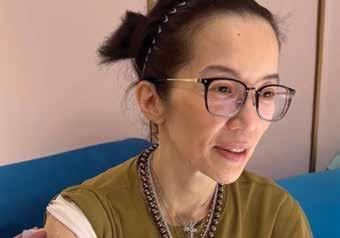
damaged lungs
wrote. “Medyo sumobra na kung pati cancer meron ako,” she added.
Kris shared in October last year that she had several tests done, including a computed tomography (CT) scan of her chest and a positron emission tomography (PET) scan,
noting the latter is done to rule out the possibility of cancer.
Kris recently gave another update on her latest health condition following her weight improvement.
The Queen of All Media said that she has two new diseases adding to her current autoimmune diseases.
by anne PaSaJol Inquirer.net
YEN Santos said there is no truth to claims she has a love child with businessman Chavit Singson, stressing that the latter is just a “good family friend.”
The actress addressed this in her first YouTube vlog shared on Wednesday, July 23, where she answered the “most asked questions” about her.
“The rumors about Manong Chavit and I having a child. Guys, the kid is not our child, he’s my brother,” she clarified. “He’s my youngest brother. I have two siblings.”
Santos said she does not usually speak about such matters but that she did so only because she was asked about it. She also noted that she even saw videos on social media claiming that her apparent child is already a preteen.
“Yes, he’s already 11 years old. But he is not my child with Manong Chavit. He’s my brother,” she reiterated.
“It’s funny because [Manong Chavit] is a good family friend. He is the godfather of my sibling,” she stressed. “This has been an

issue since I was a newbie in show business.”
Santos admitted she did not know how to respond to the rumors, and that she was hurt because her brother got involved. She even quipped that she should invite Singson for an interview so he can clear the rumors himself.
Santos also declared during the vlog that she’s “at peace” now and that it means
a lot to her to finally feel “this kind of calm.”
In the same vlog, the actress opened up about her last relationship which she described as a “nightmare,” saying it was a “blessing” it ended.
While Santos did not name anyone, it can be noted that she was previously in a relationship with actor Paolo Contis.
Filipino Americans in New York and New Jersey are helping lead mahjong’s resurgence—reimagining the game as a space for connection, culture, and community among Gen Z and millennials.
by AJPress
FOR many Filipino Americans, the sound of mahjong tiles clacking across a table is more than just a game— it’s a memory. Of lola calling a winning hand during a family party. Of titas laughing over merienda while eyeing each other’s discards. Of summers spent watching the grown-ups play under capiz chandeliers or string lights in the garage.
Now, that sound is back— and this time, it’s echoing through cozy cafés, community spaces, and trendy lounges across New York and New Jersey. A new generation of Fil-Ams is rediscovering the joy, connection, and culture behind mahjong.
A growing scene in New York and New Jersey
Across the country, mahjong’s popularity is rising. In Houston, event attendance reportedly increased by 867%, and in San Francisco by 146%, according to Axios. While region-specific figures for New York and New Jersey are not yet available, local momentum is unmistakable.
In New York City, the Green Tile Social Club— founded in 2022 by a group of Asian American friends— has hosted large-scale mahjong pop-ups in venues like The Standard East Village and community gardens. Events regularly draw hundreds of attendees in their 20s and 30s, some of them Filipino American, signaling a broader cultural embrace.
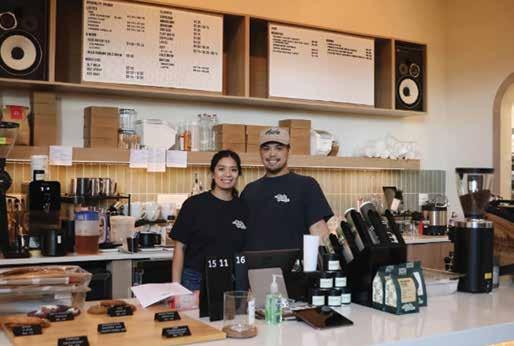
Other groups, including Mahjong Palace NYC and Riichi Nomi NYC, offer structured gameplay and teaching tables through weekly events, helping new and seasoned players build skills and community alike. Filipino participation: from community cafés to digital spaces
Filipino Americans have a longstanding relationship with mahjong, especially in home settings. Today, that tradition is expanding beyond family rooms.
In Union, New Jersey, Ayala Coffee—a Filipino-owned café—hosted a widely attended Mahjong Night during AAPI Month. The event brought together a diverse crowd of young Filipi-
no Americans, many playing openly in a public setting for the first time. Reels shared on Instagram reflected both the cultural connection and the joyful energy surrounding the game.
Beyond public venues, mahjong continues to thrive in informal, barkada-style gatherings across New York and New Jersey. Filipino American players—especially those in their 20s and 30s—are increasingly sharing clips of their private mahjong nights on Instagram and TikTok, blending casual gameplay with food, music, and social commentary. These posts highlight a generational shift: mahjong is no longer only a family-room pastime, but a
shared cultural experience, newly documented and celebrated online.
Why it resonates
For many young Filipino Americans, mahjong offers a tangible connection to heritage. The game’s tactile rhythm, communal pace, and strategic flow all contribute to its appeal. It’s one of the few activities that balances competition with camaraderie—and allows players to slow down and engage meaningfully in a fast-moving world.
The resurgence also reflects a broader Gen Z and millennial movement toward in-person experiences rooted in culture, mindfulness, and shared identity. Mahjong isn’t just nostalgic—it



feels relevant. What’s next
While there’s currently no formal Filipino-led mahjong club in the tri-state area, the groundwork is being laid. The success of events like Ayala Coffee’s Mahjong Night points to the growing potential for more community-based gatherings.
In the near future, expect to see:
• Filipino cultural nonprofits hosting mahjong workshops at festivals
• Campus-based Fil-Am orgs organizing teaching nights for students
• More digital coordination through group chats and social platforms
The demand is already here. What’s emerging now is the infrastructure to support it.
This generation isn’t simply bringing mahjong back—they’re expanding where it belongs, who it includes, and how it connects people today.

I WAS moved by the heartfelt tribute to Dr. Miraflor T. Oca-Bunye by my uncle, Atty. Ignacio “Toting” Rivera Bunye—former Press Secretary, Muntinlupa City Mayor, and Congressman. Before entering public service, he was a news reporter and war correspondent in Vietnam.
He wrote:
“Two years have passed since my beloved Mira returned to her Creator, and yet, the light she brought into our lives continues to shine with quiet grace. Mira lived her life with a rare blend of brilliance and humility, strength and tenderness.
As a pediatrician, she cared for her young patients with the same devotion and warmth she gave our three children— Trisha, Dondi, and Frannie. To generations of families in Alabang and beyond, she was more than a doctor. She was ‘Tita Doctor,’ a constant, healing presence whose wisdom and gentle hands brought comfort—and often, laughter—even in the most trying times.”
He fondly reminisced:
“In the early days of our marriage—two idealistic students dreaming big—Mira had just finished her board exams while I was wrestling with law school and final exams. Somehow, we made it work.
In fact, ‘somehow, we made it work’ would become the refrain of a marriage that endured for more than five decades—through babies and campaigns, hospital rounds and house calls, homecooked meals and ballroom Mondays. Mira led me in dance as gracefully as she led me through life. Even amid adversity, she found ways to love deeply.
Mira endured a heartbreaking illness in her final years, one that stole
her voice, her mobility, and her memories. And yet, I will always remember the day she looked toward the television and mouthed, unmistakably, ‘popcorn.’ A simple word—but in it, a whole world of shared meaning. Proof that even when words fade, love speaks clearly.”
He continued:
“One of our proudest moments came not in a grand ballroom or a church filled with guests, but in a quiet condo with our closest family, where we renewed our vows. Mira received Holy Communion for the first time in years. I believe she knew exactly what was happening—just as she knew, 50 years earlier, standing in front of the altar of St. Thérèse, that our story would be one for the ages.”
It is an honor to have been her husband—her partner in public service and private joys, in quiet moments and extraordinary miracles. In loving her, and caring for her, I found not only purpose—but God’s presence.
“The certificate of our renewed vows bore the line: ‘Valid for another 50 years.’ I smile now, knowing that love like Mira’s has no expiration. She remains with us—in every quiet morning, in every laugh of our loved ones, in every life she touched.
Thank you, Mira, for loving all of us so completely. And thank you, Lord, for the priceless gift of her life,” he said with a sweet, wide smile. His mother, Sofia V. Rivera, was a pre-war movie actress known by the screen name Gloria Imperial. Her younger sister, Mila del Sol, was also a beloved movie star of her time.
*
The tribute brought back fond memories of my training with the Career Executive Service Board’s Paglaum Batch 13, alongside government executives.
Paglaum—the Visayan and Bicolano word for “hope”—
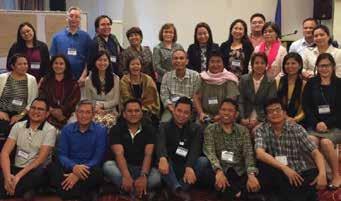
by ToTing Bunye, newS rePorTer and war CorreSPondenT

aims to rekindle optimism and help rebuild the lives of survivors of calamities and disasters. It is a threeday experiential learning program designed to equip participants with the skills and competencies needed to provide psychosocial first aid to survivors. Graduates are called “hope-bearers,” symbolizing their new calling after completing the training.
The Paglaum Training Workshop has since been enhanced to better support the personal healing of its participants and to strengthen their capacity to bring hope and recovery to others.
The “Likha” Exhibit, through the indefatigable efforts of First Lady Louise AranetaMarcos, continues to make a significant mark in its fourth year. This year’s showcase features over 30 new artisans, LIKHA graduates, and local designers from across the Philippines.
It is a celebration of Filipino craftsmanship and artistry— aimed at empowering local artisans and preserving the

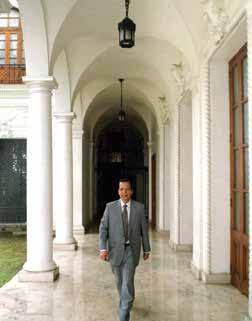



richness of Philippine cultural heritage. The exhibit provides a platform for artisans to display and sell their creations, highlighting the ingenuity, resilience, and creativity of the Filipino spirit.
* * *
Belated birthday greetings to fellow Kapampangan Claire Beltran of Hiddenbrooke, Vallejo, California.
* * * Congratulations to Christina U. Aliada, president of the Rotary Club of Manila
Villamor, for being named United Chosen President for Rotary Year 2025–2026. She also serves on the Board of the FAMAS (Filipino Academy of Movie Arts and Sciences) Awards—the oldest existing film industry awardgiving body in the Philippines and one of the oldest in Asia.
Established in 1952, the FAMAS Awards represent the highest honor a filmmaker or artisan can receive in the Philippine movie industry.
* * *


Many thanks to Sticker Mule CEO Anthony Constantino of Amsterdam, New York, for the T-shirt and stickers. I love them!
* * *
The opinions, beliefs and viewpoints expressed by the author do not necessarily reflect the opinions, beliefs and viewpoints of Asian Journal, its management, editorial board and staff.
* * * rogeliocmedina@yahoo.com
by AJPress
LOS ANGELES, CA —
Former Filipino actor and television personality BB Gandanghari has proudly marked a new milestone in her journey of personal reinvention. On July 10, Gandanghari announced on Instagram that she had graduated summa cum laude from the Los Angeles Film School, completing a Bachelor of Science in Entertainment Business.
Clad in a black toga and beaming with pride, she wrote:
“To God be the glory! SUMMA CUM LAUDE it is!!! With perfect attendance, Student of the Month, and Honor Society member — what more can I ask for?”
From celebrity to student: A second degree earned
This is Gandanghari’s second degree. She previously earned a Bachelor of Arts in Economics from Saint Louis Universityin Baguio City, Philippines.
The matinee idol years as Rustom Padilla
Before transitioning, Gandanghari rose to fame in the 1990s as Rustom Padilla, a matinee idol and member of the well-known Padilla acting family. She starred in hit films such as Mistah (1994), Maruja, Kadenang Bulaklak, and Nandito Ako, often paired with top leading ladies of the era.
In 1998, she married actress Carmina Villarroel.
The marriage was annulled in 2002.
Coming out and embracing her truth
In 2006, Gandanghari came out as gay on Pinoy Big Brother: Celebrity Edition. Three years later, in 2009, she publicly identified as a transgender woman and adopted the name BB Gandanghari—a stylized moniker blending beauty and strength.
In 2016, a California court legally recognized her name and gender marker. In 2022, she became a naturalized U.S. citizen.

“Rustom is dead. That person no longer exists,” Gandanghari once stated in a televised interview, emphasizing her full embrace of her true identity.
Life in the U.S.: A fresh start
After relocating to the United States, Gandanghari took on everyday jobs—including as a ride-share driver and caregiver—while continuing to advocate for LGBTQ+ visibility and authenticity.
She later enrolled at the Los Angeles Film School, where she studied Entertainment Business, focusing on brand strategy, production management, and entrepreneurship in the creative industries.
Graduation with honors Gandanghari’s graduation was marked by multiple
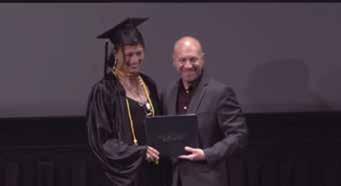
by yoniel aCeBuChe Philstar.com
KYLIE Verzosa just made a big move—and it's one straight out of a Mediterranean dream.
In an Instagram post, the Miss International 2016 titleholder revealed that she and her friends have purchased a stunning villa, called Villa Sogno, in the picturesque region of Puglia, Italy.
"Bought a house in Italy," Kylie said in an IG story, while tagging some of her friends, including Danish musician Tomas Barfod.
Barfod, on the other hand, celebrated by sharing photos of their new home with the caption, "We bought a villa." He tagged Kylie and four other friends: Chiara Yee, Emil Eriksen, Enzo Yee, and Oscar Trap.
Villa Sogno has distinctive features including a private courtyard, a pool, cobblestone paths, and elegant arched facades. It also houses six bedrooms and four baths.
Moreover, the place also caters to an old-fashioned yet elegant ambiance, thanks

to its arched windows, lightcolored stone walls, and curved ceilings that glow.
from Instagram/@gandangharibb
academic recognitions. In her Instagram post, she mentioned:
“A second degree under my belt… now equipped with tools and purpose to tell stories that matter.”
While the summa cum laude distinction is typically awarded to students with high academic achievement, the Los Angeles Film School does not publicly disclose specific GPA thresholds for honors.
A platform for representation
Following her graduation, Gandanghari expressed her desire to create inclusive, meaningful content, reflecting her journey as a transgender woman and immigrant.
“This is a personal victory that I dedicate to all dreamers,” she said. “Never stop evolving.”
From spotlight to summa: A story of resilience
From her heyday as a Philippine film star to her quiet determination as a student in Los Angeles, BB Gandanghari’s story is one of courage, reinvention, and grace. Her academic achievement adds a new dimension to a life already marked by bold transformations—and a deep commitment to telling stories that uplift and include.



In the dining and kitchen area, rustic furniture like a wooden farm table and wicker chairs give the room a cozy feel. Its big, modern light fixture hangs overhead, along with ceramic lamps and other earthy decorations.
The rustic vibe also translates to the bedroom, which has walls designed with curved stone by the ceiling and a canopy bed frame lined with white curtains. A freestanding bathtub sits at the foot of the bed.
Beaches like the Torre dell'Orso, Baia dei Turchi, Alimini Beach, and Spiaggia di Porto Badisco are 20 minutes away from the property.
Kylie bagged the Miss International title in 2016. She also clinched the Best Actress award at the Distinctive International Arab Festivals Awards 2022 for her performance in the movie The Housemaid. In 2024, she also launched her business venture, shapewear brand SOLÁ.
